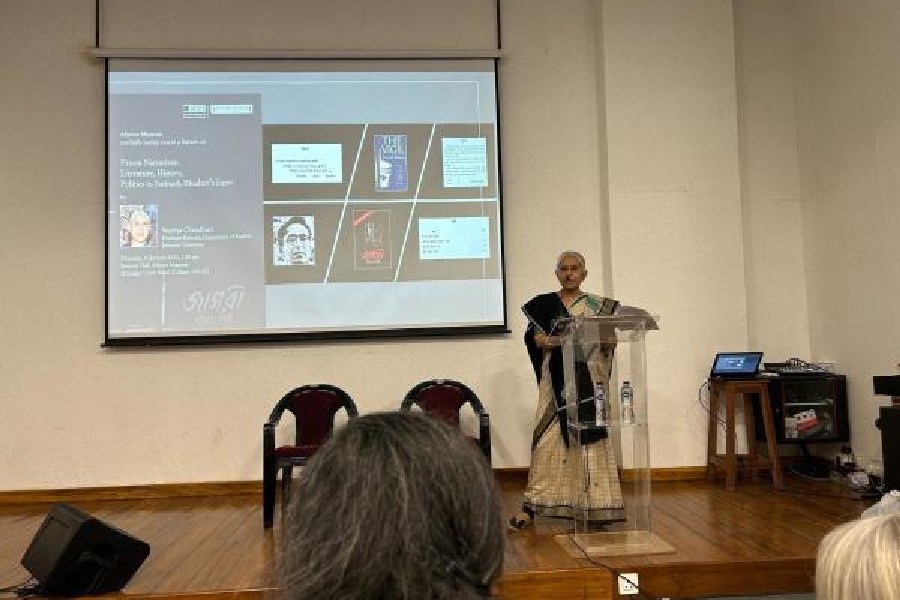A novel set in the cells of Purnea Central Jail in 1945 was the subject of a lecture at the new auditorium of Alipore Museum which itself used to be a jail and correctional home till 2019.
The Alipore Central Jail has seen many a political prisoner — both during colonial rule and after, particularly during the Naxalite movement of the '70s.
Supriya Chaudhuri, professor emerita, Jadavpur University, while delivering the lecture titled "Prison Narratives: Literature, History, Politics" in Satinath Bhaduri's Jagari, remembered her fellow student, Prabir Raychaudhuri, and his elder brother Pradip who were imprisoned in the Alipore jail in 1971 and both of whom died allegedly at the hands of the police.
"Prabir's prison letters to his mother, with those of other inmates, like Rajashri Dasgupta, have been published in 2023 under the title Jail Theke Ma-ke, edited by Ajay Basu Ray and Satyen Bandopadhyay," said Chaudhuri.
She also remembered "friends and colleagues who have been and are now in prison, many of them awaiting trial and without charges being filed in a supposedly independent India".
Jagari, which won the Rabindra Purashkar in 1950 and is included in the Unesco Collection of Representative Works, is based on his own experience of imprisonment as district secretary of the Indian National Congress in Purnea, Bihar. He was twice imprisoned in the Bhagalpur jail during 1940-41 and then in the aftermath of the Quit India Movement from 1942 to 1945.
"It is this grounding in experience, strengthened by the statement that the book must be read in the background of the 1942 August revolt in the preface, that imparts an unmistakeable ring of authenticity to the voice of Satinath's protagonist Bilu," said the professor.
Jagari was Satinath’s first novel and “it bears out the Aristotelian position that literature is more philosophic and of greater import than history since its statements are of the nature of universals while those of history are singulars,” Chaudhuri said.
"It also lends a fabular, even parable-like quality to Satinath's decision to portray the political conflicts of the nation as conflicts within four members of the same family."
Jagari is composed as a set of four stream-of-consciousness first-person narratives covering the span of a single night and representing the thoughts of four members of a single family inside and at the gate of Purnea Central Jail in Bihar.
The first and longest narrative is that of the protagonist, Bilu, a Congress socialist worker, sentenced to death for acts of sabotage during the 1942 August revolt. He is awaiting his hanging the following morning in the condemned or phansi cell.
This is followed by the thoughts of his father, an old-style Gandhian spinning on a charkha in the upper division ward. Then his mother in the women's ward, and finally his brother, Nilu, a Communist worker who is waiting at the gate of the jail to receive his brother's body for cremation after his hanging. Since it is Nilu who has given evidence against Bilu at his trial for criminal sabotage, and is therefore responsible for his brother's death sentence, the atmosphere both within and outside the jail is taut with tension.
"While Jagari is to the best of my knowledge one of the earliest Bengali stream-of-consciousness novels, the mode itself was inaugurated by Urdu modernists belonging to the progressive movement,” Chaudhuri said.
The only parallel to Jagari that came to the professor's mind was also a political novel, Rabindranath's Char Adhyay, which is not a one-day novel and "not stylistically like Jagari but there is a similarity to the form of Jagari," she said.
Bilu at the end is reprieved of his sentence by an unexpected and arbitrary decision.
"It is clear that Satinath is suggesting that moral responsibility weighs heavily on each of the four central characters as it does on the flawed and divided makers of our flawed and divided nation," she concluded.
